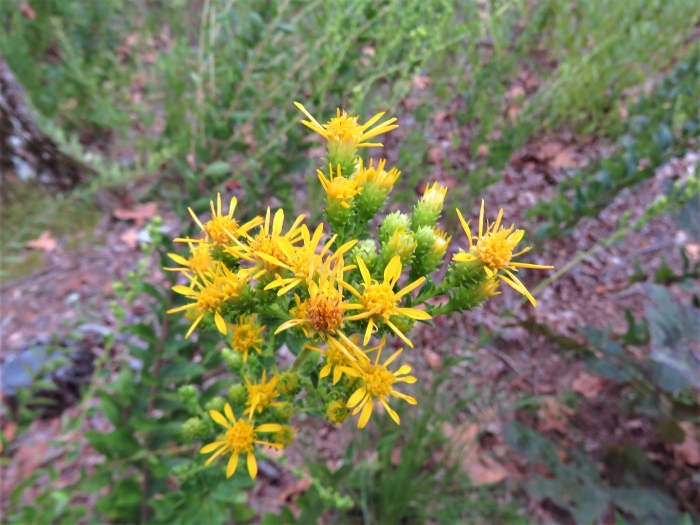Downy Ragged Goldenrod
(Solidago petiolaris)
Downy Ragged Goldenrod (Solidago petiolaris)
/
/

Annika Lindqvist
CC BY 4.0
Image By:
Annika Lindqvist
Recorded By:
Copyright:
CC BY 4.0
Copyright Notice:
Photo by: Annika Lindqvist | License Type: CC BY 4.0 | License URL: http://creativecommons.org/licenses/by/4.0/ | Rights Holder: Annika Lindqvist | Publisher: iNaturalist | Date Created: 2021-09-08T08:34:56-07:00 |























Estimated Native Range
Summary
Solidago petiolaris, commonly known as Downy Ragged Goldenrod, is a deciduous perennial herb native to prairies, open woodlands, and roadsides in the Southern United States and Northeastern Mexico. It typically grows to a height of 2-4 feet (0.6-1.2 meters) and a width of 0.5-1 feet (0.2-0.3 meters). The plant features lanceolate leaves and produces clusters of small, bright yellow flowers that are particularly showy from late summer to fall, attracting pollinators such as bees and butterflies.
Downy Ragged Goldenrod is valued for its ease of maintenance and its ability to thrive in a variety of conditions, making it a versatile choice for naturalistic plantings, meadow gardens, and borders. It is drought-tolerant once established, which makes it suitable for xeriscaping. This goldenrod is also used for restoration projects as it is beneficial for soil stabilization and provides habitat for wildlife. It prefers full sun to part shade and adapts to a range of soil types, provided they have good drainage. While it is generally disease-resistant, it can occasionally suffer from rust or mildew in humid conditions. Downy Ragged Goldenrod is not typically aggressive, but in optimal conditions, it can spread through rhizomes and self-seeding, which should be monitored to prevent unwanted spread.CC BY-SA 4.0
Downy Ragged Goldenrod is valued for its ease of maintenance and its ability to thrive in a variety of conditions, making it a versatile choice for naturalistic plantings, meadow gardens, and borders. It is drought-tolerant once established, which makes it suitable for xeriscaping. This goldenrod is also used for restoration projects as it is beneficial for soil stabilization and provides habitat for wildlife. It prefers full sun to part shade and adapts to a range of soil types, provided they have good drainage. While it is generally disease-resistant, it can occasionally suffer from rust or mildew in humid conditions. Downy Ragged Goldenrod is not typically aggressive, but in optimal conditions, it can spread through rhizomes and self-seeding, which should be monitored to prevent unwanted spread.CC BY-SA 4.0
Plant Description
- Plant Type: Herb
- Height: 2-4 feet
- Width: 0.5-1 feet
- Growth Rate: Moderate
- Flower Color: Yellow
- Flowering Season: Summer, Fall
- Leaf Retention: Deciduous
Growth Requirements
- Sun: Full Sun, Part Shade
- Water: Medium, Low
- Drainage: Medium, Fast
Common Uses
Bee Garden, Bird Garden, Border Plant, Butterfly Garden, Deer Resistant, Drought Tolerant, Hummingbird Garden, Low Maintenance, Rabbit Resistant, Showy Flowers, Street Planting
Natural Habitat
Prairies, open woodlands, and roadsides
Other Names
Common Names: Downy Goldenrod
Scientific Names: , Solidago petiolaris, Solidago lindheimeriana, Aster lindheimeranus, Aster lindheimerianus, Aster petiolaris, Leioligo elata, Leioligo erecta, Leioligo petiolaris, Solidago milleriana
GBIF Accepted Name: Solidago petiolaris Aiton